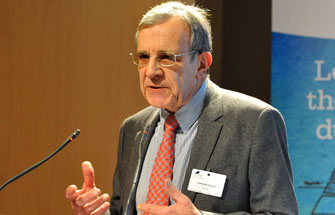Mr Yannick Chagon, the new Chairman of the French Banking Organisation and Standardisation Committee (CFONB), assumed his duties after a career at Societe Generale, where he was in charge of payment services. He met the Monaco Association for Financial Activities (AMAF) on 10 June 2016.
Could you remind us what the CFONB's missions are?
The CFONB has two missions:
First, it promotes and organises the creation and definition of professional rules for payments. To do this it establishes useful consultative and cooperative relationships with French, European and international public authorities, professional and inter-professional organisations.
The CFONB also acts as a standardisation bureau on behalf of the banking and finance profession and contributes to the formulation, development and progression of related French, European and international standards in liaison with the affected stakeholders.
Does it have strong ties to the Principality?
Absolutely, and I am delighted to visit the AMAF. It's the first time I've been. The relationships developed over the last six years are excellent. As a member of the CFONB, the AMAF can take advantage of the information that we share, and beyond that there is a real exchange of ideas and perspectives. My visit builds on these very positive relationships. In addition to our usual working meetings, we organised an edition of the "Meetings of the CFONB" in Monaco for the first time last November, and I have suggested we organise another event before the end of the year. We can see the real desire of Monaco's authorities not to not overlook the major changes affecting our continent. Even if the Principality is not 100% integrated in the European Union, it knows how to maximise the quality of its payment methods.
Is the CFONB's current environment constantly changing?
We witnessed a revolution when the SEPA (Single Euro Payments Area) system was introduced. It took 12 years because it wasn't easy to unify processes that had strong national significance.
Now, we must also incorporate the multitude of technological innovations: France created a national committee for cashless payments, chaired by the Bank of France, whose main objective is to coordinate the implementation of the French payment methods strategy. Taking into account these technological changes among other things.
It should also be noted that while the Europe of payments was built at the initiative of the banks, its evolution will include other non-bank stakeholders in the future. Banks will no longer be the only ones to control changes to payment services.
What other projects are you working on?
I will single out three from the many projects currently being assessed by our working parties.
Instant payments that take just a few seconds. We are faced with organisational and procedural issues. We have to settle and clear transactions, and above all protect ourselves against fraud.
The evolution of cheques and the promotion of transfers: the use of cheques is outdated. We are trying to reduce its share in the payments market by offering alternative, simpler solutions that are better suited to the modern world. Credit cards are one such alternative, along with bank transfers, which are still not used enough in France. On this topic, I would not be surprised if Monaco's marketplace were more advanced.
European regulations of the information concerning originators and beneficiaries of transfers: the traceability of the exchanges, required by the European Union is a key issue.






